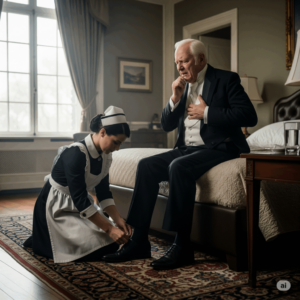The Day TLC Took a Stand: Inside the Legendary Standoff at Arista Records
In the history of music, few moments stand out like the day TLC decided to stop being quiet. They weren’t just another platinum-selling girl group—they were three women who made one of the boldest moves in music history. What began as frustration over money turned into a direct confrontation with two of the most powerful men in the industry: Clive Davis and Sean “Diddy” Combs.
At the height of their fame, TLC—T-Boz, Chilli, and Lisa “Left Eye” Lopes—had just made $75 million from their album CrazySexyCool. The problem? They only received $50,000 each. That disconnect between success and payout was not just shocking—it was a breaking point. Tired of being misled, TLC skipped the lawyers, skipped the press, and went straight to the top. They pulled up to Clive Davis’s office at Arista Records in New York and took over.

This wasn’t symbolic. This wasn’t a PR stunt. This was a full-scale confrontation. TLC showed up with backup—Lisa had met a crew of intimidating women while in a diversion center, women who knew how to send a message. Their plan was simple: either they got answers, or nobody left that building.
When they arrived, Diddy—then still going by Puffy—was already in a meeting with Clive Davis. That didn’t matter. TLC’s team interrupted it. One of them told Diddy point blank: “TLC’s got a meeting with Clive. Your meeting’s over.” Puffy left. That wasn’t the end of his involvement though—he later called Clive, reportedly saying, “Yo B, your girls up here mad bugging,” effectively alerting Clive to the growing tension.
Inside Arista, the group and their team tore down every award, plaque, or poster with TLC’s name on it and loaded them into a limo waiting outside. It was part protest, part reclamation. Meanwhile, one of their members acted as security at Clive’s office door. No one went in or out without their say.
They confronted Clive directly. Told him about the money. Told him how LA Reid blamed everyone else. Told him they were tired of the lies. It wasn’t a hostile takeover—it was a desperate stand. The police were eventually called, but Clive had a choice: press charges and face headlines or keep it quiet. He chose the latter.
TLC left without being arrested, but they didn’t leave empty-handed. The confrontation triggered renegotiations. While the new deal still wasn’t ideal—most of the money was considered recoupable by the label—it was a start. The music industry took notice. Arista Records began implementing stricter security measures. Even artists had to sign in and be patted down, all because three women from Atlanta made a scene that couldn’t be ignored.
What made TLC’s move more impactful was that it wasn’t just about money—it was about power. They didn’t ask for permission. They didn’t follow the “right channels.” They pulled up and demanded respect. And from that moment on, nobody in the industry looked at them the same way again—not Clive Davis, not Diddy.
Chilli’s subtle yet pointed laugh at a later joke about Diddy’s possible jail time during a live TV moment added another layer to the story. When Rosie O’Donnell joked, “TLC has eight nominations, and Sean Combs has five… to ten,” Chilli laughed harder than anyone else. Her face lit up, not just with amusement, but with something deeper—perhaps relief, or maybe even satisfaction. Some believed she knew something the public didn’t.
Years earlier, Chilli had dated Usher. What many didn’t realize was that Usher, at just 14 years old, had been sent to live with Diddy in New York by LaFace Records. Usher would later recall seeing “wild” things during his time with Diddy—things he didn’t fully understand back then. As their relationship unfolded, Chilli may have learned more than she ever wanted to know about what went on behind the scenes.
There were rumors. Usher was hospitalized after a situation involving Diddy. Legal documents later surfaced referencing an unnamed artist with a Vegas residency and a Super Bowl halftime performance—details that fit Usher’s career. If Usher had indeed experienced something traumatic during his time in Diddy’s world, and if he confided in Chilli, it would explain her visible discomfort and eventual distance from both men.
But the real firestarter of the story was Lisa “Left Eye” Lopes.
Lisa wasn’t content with small wins. She wanted to understand why things had gotten so bad in the first place—how three women could sell millions of records and still be broke. When she decided to act, it wasn’t just about fighting back—it was about uncovering the truth. Her move to Death Row Records stunned the industry. The most vocal member of TLC had just aligned herself with one of the most infamous labels in history.
It sent a message: she wasn’t afraid.
But Lisa’s story ended abruptly. Before she could fully explore what was behind the money trail or expose what she believed was hidden from them, tragedy struck. Her death in a car accident left a gap in the group and in the music world.
Still, the legacy of that day at Arista remains. TLC didn’t just demand money—they demanded acknowledgment. They proved that artists weren’t just puppets. They could be bold, strategic, and unshakeable.
Years later, people still talk about that standoff not because it was dramatic, but because it changed how artists viewed power. It became a symbol for every artist who felt used, undervalued, or silenced. TLC reminded the industry—and fans—what happens when talent refuses to be taken for granted.
And they didn’t need a lawyer to do it. Just a limo, some backup, and the truth.





